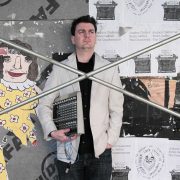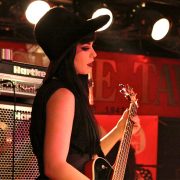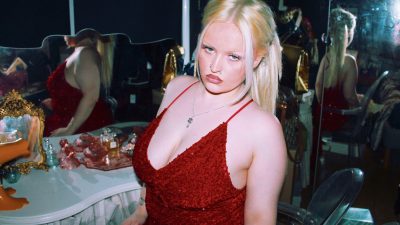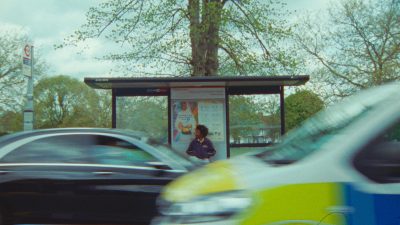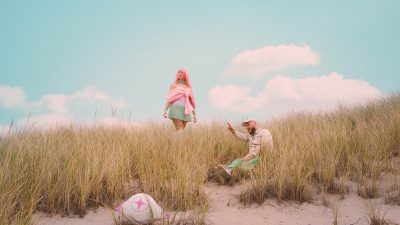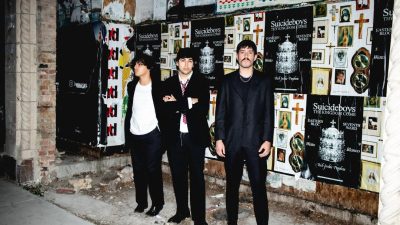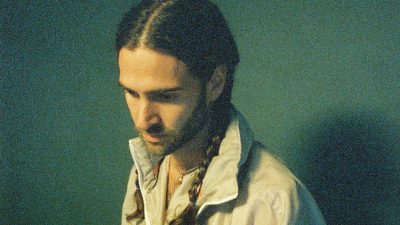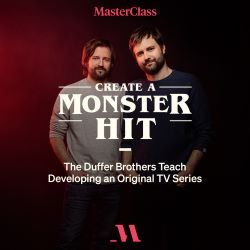NXNE Interview: J.F. Robitaille
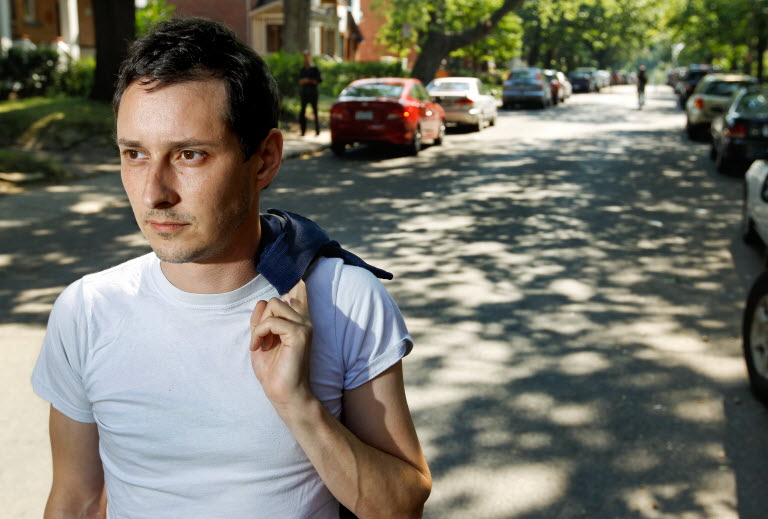
text: Michael Raine
With two broken bands, a lost album, a bankrupt record label and stints in London and New York City all in his past, J.F. Robitaille can’t be accused of lacking indie-cred or not paying his dues. But the Montreal singer-songwriter is now getting some well-earned credit. His latest album, Calendar, which he’s been touring for roughly the last year, has received overwhelmingly positive reviews and is generating a lot of buzz online.
Relaxed and charming, Robitaille took some time off during North by Northeast (NXNE) to sit down at the Hyatt Hotel in Toronto and discuss his career, art, and influences, past and present.
A couple days earlier Robitaille played the Go Folk Yourself evening in the cave-like backroom at the Cameron House bar in Toronto. Showcasing such well-crafted songs as Modern Love Song pt. 1, Winters Like These and Everything’s Broken Here, it was easy to see how his vivid lyricism, sparse acoustic instrumentation, and almost-spoken singing style has earned him constant comparisons to Montreal’s patron saint of songwriting, Leonard Cohen (although, truthfully, he sounds more like Bright Eyes’ Conor Oberst circa I’m Wide Awake It’s Morning, which isn’t a bad thing).
* * *
Michael: It seems your focus is on lyrics above anything else. Where do you find inspiration for songs and was there a running theme on the new record?
J.F. Robitaille: Definitely not a running theme on this record, although I think it seems like it because it was all written in a two-year period.
The inspiration, mostly, you know, I read books and films and all the usual creative inspiration. I try to make sure that my life is full of stuff like that.
M: So what books have you been reading lately?
JFR: Good question. I’ve been reading some Civil War histories. Kind of light reading, not heavy stuff. I don’t think this year I’ve been reading any heavy literature, more historical stuff.
M: Some people would consider that heavy.
JFR: Well, you know, heavy in that doesn’t make you think about life. Also, I’ve been watching some German films and stuff like that. I shouldn’t talk about this. [Laughs] You have to twist it so that I don’t sound like such an ass.
M: You were in two bands before you went solo. Rev 32 and…
JFR: How did you know that?
M: I did my research
JFR: Rev 32, wow.
M: And after Rev 32 you formed Social Register. How did your experience in those bands influence you as a solo artist and why did you decide to go solo?
JFR: I think with the Social Register it was basically me and a bunch of friends and most of the friends are still there and they’re on the record. It was just limiting being in a band and how you’re perceived. You don’t own it, really. I felt the understanding was that it was my thing and I did everything, but then it’s the “Social Register.” I didn’t feel personally invested in this fictitious name. So you put all that work into something, like you’re putting it into something that exists. So I thought I’d go do a solo thing so at least it’s my name and myself and at least it’s being honest.
And then some people think it’s a strange decision to go with my actual name, which isn’t the catchiest in the world. That’s another side of it; I’d rather invest in the reality of myself.
M: Speaking of, what does the J.F. in J.F. Robitaille stand for?
JFR: Jean-Francois.
M: Do you write songs differently for yourself than you did for a band?
JFR: Yeah, the next thing was, if you want to go solo, think of myself onstage with a guitar. It has to have some kind of resonance. I want it to be kind of conversational. Like you said about the emphasis on the words, well that’s pretty much all I have to offer. You know, interesting guitar is probably only interesting for 20 minutes or something like that. So yeah, I wanted it to be kind of a personal experience so that led to thinking about the words more.
M: Is the record all you or is it more of a collaboration with the producer and backing band?
JFR: Definitely a collaboration in terms of the arrangements. Most of the songs fit into a classical structure, like a waltz or a ballad. So you make it a little more interesting, on this record Murray [Lightburn] came in and did a lot of stuff and he’s in The Dears, so it’s like the polar opposite from what I do. I think it kind of comes out in the middle, if that makes sense. But to answer your question, yes, it’s a collaboration.
M: At one point you moved to London, England and then to New York and then back to Montreal. What inspired all the moves?
JFR: London, I was always obsessed with British culture as a teenager. I got out of high school and went to San Francisco for a little bit, following another obsession. Some of my friends were moving to London so we all went together for about a year and a half. So yeah, I loved British culture and also the music scene is great, as far as coffee shops and such. You can play all the time.
Then New York, my girlfriend at the time was moving to New York so we kind of moved. So that was like a love decision. But you know, it’s a great place for music.
M: You recorded an album in New York that never came out. What happened?
JFR: I signed a record deal with a label called Rythmbank. Nona Hendryx from Labelle started a record label through Warner Brothers and I recorded an album and then they went out of business and didn’t give me the record back. They own it now, so it was like a lost record. But an EP [The Blood in my Body] came out that I think had the best songs. There were 13 songs on the record and five are on the EP.
I wanted to tour so I was like, “Before the record comes out, can we put out an EP?” and after that they went bankrupt. I lost the record but it’s not as dramatic as it sounds and some people would make it out to be more. It was fine, I write a lot so I didn’t mind.
M: How long did it take you to move on from that experience and start making the latest album?
JFR: A long time because there was a lot of questioning of whether there was something I could do to get that record out. You hear things but my instinct was to just forget it and move on but some people would be like, “That’s crazy.
You have this record and blah, blah, blah.” But I moved on and I started to think about this record, [Calendar], about two and a half years ago. It just took a really long time to set everything up, find a new label, et cetera.
M: Did you consciously set out to write a new record or just went into the studio when you happened to have enough songs?
JFR: I definitely consciously wanted to write a new record. I wanted to write a better record than the one that I had lost, so that was my initial motivation. So forget those songs and I will just write better songs. So that was like the rule for this record; everything has to be way better than the one before.
M: In just about everything that is written about you, you’re compared to Leonard Cohen. Do you find that comparison frustrating or daunting?
JFR: No, maybe initially it was a little daunting, if I took it too seriously or something. But really, it’s sort of an obvious thing for someone to say. I think it’s really cool because there are a lot of bands and songwriters out there who are rootsy and folky.
The Leonard Cohen thing, hopefully, the best I can take out of it is that he’s not rootsy and I don’t play rootsy music either. He’s kind of an outsider too. He doesn’t get lumped in with, like, James Taylor and Jackson Brown; strum-y singer-songwriters. He has more of a European influence in a way.
I could hope that I could somehow be aside like that, in a weird category as opposed to rootsy singer-songwriter.
M: Folk music, rootsy music, whatever you want to call it, it has its ebbs and flows but it’s always around. Why do you think it has such longevity?
JFR: I don’t think my record isn’t following any trends and I think a lot of rock bands, especially these days… I couldn’t imagine if I was trying to sustain a rock and roll band in the commercial [world] or trying to exist outside of it. I don’t know how good Grimes is going to sound in five years. That’s a weird example because she’s not a rock band but I don’t want to name anyone because all the names popping into my head are friends.
But yeah, [folk] is not trendy music, at least if you stick to a template. I think a record like Calendar could’ve come out in 1970 or 1980.
M: Do you ever get the urge to go back to a rockier sound?
JFR: Yeah, I don’t think rockier, but more instruments and go back to my Beatles obsession. I don’t know, we’re talking about it now and there is more stuff going on.
M: You mention the Beatles obsession. You opened for Sean Lennon once. Were you able to meet him?
JFR: Yeah, he wouldn’t talk before the show, which is really funny. So I was all ready to have that story about, “Oh, what a dick” but he was preserving his voice and then after the show he was amazing; a really, really nice guy. I thought it was really funny because you know he’s a multi-millionaire but he’s touring in an indie rock band, or he was. I think the whole band was on a bus and he was flying. Hilarious, say goodbye to your band and they get on this shitty bus and he probably takes a limo and private jets.
M: Did you ask him anything about his dad or did you play it cool?
JFR: I played it cool.
M: Do you remember a moment when you knew you wanted to dedicate your life to music?
JFR: Probably when I was 14 or 15, I had the dreams that everybody has. You want to be in a rock and roll band and be in a gang and then be The Beatles and be massive. That goes away around 17, 18, 19 and that’s when I really wanted to take it seriously and be an adult playing music, which sounds lame. I didn’t want to be in a rock and roll band.
That was kind of a moment, that’s where you find inspirations in people like Leonard Cohen, Tom Waits, people who are artists for their whole lives.
All I can say is that I love singing and writing music and recording so much and nothing else comes even close, so I’d really be cheating myself if I didn’t do it.
M: Certain genres like folk and the blues tend to lend themselves to longer careers than stuff like dance and indie. Is that something you’re looking for, to keep performing as you get old?
JFR: Yeah, like Jonathan Richman – people know him from There’s Something About Mary, he’s the guy in the tree – he’s had a really, really great career, or someone like Tom Waits or Loudon Wainwright or even Rufus [Wainwright].
These kind of people who exist in their own little world and they don’t need… like Tom Waits has a famous quote where he says something like, “If you can go to any city in the world and play to a 100 people, or have 100 people come see you, you’ll have a career for life.” So that’s the goal: a modest audience that you can write for.


